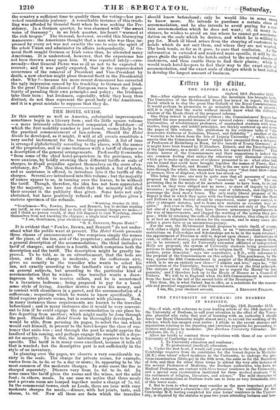THE HOTEL GUIDE.
IN this country as well as America, substantial improvements sometimes begin in a literary form ; and the little square volume —a more intensely salmon-coloured companion of Bradshaw—of which the first monthly number is just issued, seems likely to be the practical commencement of Inn-reform. Should the Hotel Guide be developed, as it might, it will at all events constitute a very useful instillment for the travelling public. A list of inns is arranged alphabetically according to the places, with the names of the proprietors, and in some instances with a tariff of charges or a description of the general arrangements. Professedly it emanates "from some of the chief hotel-proprietors in the provinces, who were anxious, by boldly avowing their different tariffs or scale of charges, to dispel prejudice against themselves on the score of ex- orbitancy, &e." The idea, therefore, is to publish a list of hotels, and as assistance is offered, to introduce into it the tariffs of the charges. Several are introduced into this volume ; but the majority of names appear to us, in turning over the leaves, to be without the tariff. Though, therefore, the idea has not been appreciated by the majority, we have no doubt that the minority will find
• their account in the publicity thus given. Some have not only • abstained, hut have positively refused; and the preface gives a curious specimen of the refusals.
“Worthing, October 29, 1853. "Gentlemen—We, Fowler, Brown, and Bennett, beg to decline sending any tariff, as our customers find no fault of the present charges we make,— and I think no person would, if they felt disposed to visit Worthing, absent themselves from not knowing the charges ; a single trial would prove.
"I am, Gentlemen, your obedient servant,
"S. T. BENNETT, Steyne Hotel."
It is evident that "Fowler, Brown, and Bennett" do not under- stand what the public want at present. The Hotel Guide presents three classes of announcement. One comprises simply the names of the place, of the inn, and of the proprietor ; another class gives a general -description of the accommodation; the third includes a tariff of charges; and there is a fourth, which comprises both the -description and the tariff. The description might be greatly im- proved. To be told, as in an advertisement, that the beds are clean, and the charge is moderate, or the coffeeroom airy, gives no security to the traveller who wants to select his • inn, not exactly according to the landlord's view of its merits ott general subjects, but according to the particular kind of accommodation that he wishes. One traveller wants a draw- ingroom in which to receive callers, and he is accustomed to a luxurious bedroom ; being prepared to pay for a hand- some style of living. Another desires to save his money, and is content with cleanliness in a garret, and the accommodation of a eoffeeroom ; respecting which he wants to know specifically. A third requires private rooms, but is content with plainness. Now, in many instances these requirements are known to the traveller beforehand ; and in many instances also it would be very conveni- ent to him if he could engage the accommodation in one place be- fore departing from another; which might easily be done through the post. Should this Hotel Guide be thoroughly developed, he would be able, from perusing its pages, to select the inn which would suit himself, to present to the hotel-keeper the class of cus- tomer that suits him ; and through the post he might apprize the landlord of his coming, and perhaps engage the rooms with a depo- sit for security. To do this, the information requires to be more specific. The tariff is in many cases excellent, because it tells all that is wanted; but the descriptive part is not sufficiently in the style of an inventory. In glancing over the pages, we observe a very considerable va- riety in the scale. The charge for private rooms, for example, vanes from 3s. to 6s. or 8s. a day or more; 3s. appearing to be the most common of the moderate charges. In some cases the fire is charged separately. Dinners vary from is. 6d. to 3s. 6d. In some eases the tariff gives the rooms and the wines, not the solid food ; in others, meals. In one case we notice that three meals and a private room are lumped together under a charge of 78. 6d. In the commercial towns, such as Leeds, there are inns with very moderate charges for meals,—dinner, with hot joints, tarts, and cheese, is. 6d. Now all these are facts which the traveller should know beforehand ; only he would like in some eases to know more. He intends to purchase a certain class of accommodation, and he also intends to avoid paying for a cer- tain accommodation which he does not want; or, in many in- stances, he wishes to avoid an inn where he cannot get acoormoo. dation on the scale which he desires, and which he is willing to pay for. Much ill blood arises from the straying of customers to hotels which do not suit them, and where they are not wankd. The hook tends, so far as it goes, to cure that confusion. As the information is extended and rendered more specific, it will by de- grees ghide the public to the hotels suited to the several classes of customers, and thus enable them to find their places; while it would teach hotel-keepers to feel their way to the exact style of accommodation, and the exact scale of charges which is best suited -to develop the largest amount of business.


































 Previous page
Previous page